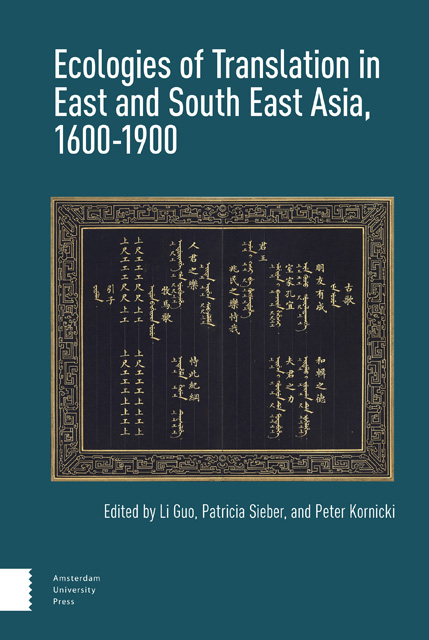Book contents
- Frontmatter
- Table of Contents
- Introduction: Scriptworlds, Vernacularization, and Shifting Translation Norms
- 1 On Not Being Shallow: Examination Essays, Songbooks, and the Translational Nature of Mixed-Register Literature in Early Modern China
- 2 A Faithful Translation: Tsūzoku sangokushi, the First Japanese Translation of Sanguozhi yanyi
- 3 Romance of the Two Kingdoms: Okajima Kanzan’s Chinese Explication of ‘The Annals of Pacification’ (Taiheiki engi)
- 4 Speaking the Sinitic: Translation and ‘Chinese Language’ in Eighteenth-Century Japan
- 5 ‘Body Borrowed, Soul Returned’: An Adaptation of a Chinese Buddhist Miracle Tale into a Vietnamese Traditional Theatrical Script
- 6 ‘Out of the Margins’: The Western Wing Glossarial Complex in Late Chosŏn and the Problem of the Literary Vernacular
- 7 Vernacular Eloquence in Fiction Glossaries of Late Chosŏn Korea
- 8 Imagined Orality: Mun Hanmyŏng’s Late Nineteenth-Century Approach to Sinitic Literacy
- 9 Linguistic Transformation and Cultural Reconstruction : Translations of Gorky’s ‘Kain and Artem’ in Japan and China
- Index
7 - Vernacular Eloquence in Fiction Glossaries of LateChosŏn Korea
Published online by Cambridge University Press: 16 November 2022
- Frontmatter
- Table of Contents
- Introduction: Scriptworlds, Vernacularization, and Shifting Translation Norms
- 1 On Not Being Shallow: Examination Essays, Songbooks, and the Translational Nature of Mixed-Register Literature in Early Modern China
- 2 A Faithful Translation: Tsūzoku sangokushi, the First Japanese Translation of Sanguozhi yanyi
- 3 Romance of the Two Kingdoms: Okajima Kanzan’s Chinese Explication of ‘The Annals of Pacification’ (Taiheiki engi)
- 4 Speaking the Sinitic: Translation and ‘Chinese Language’ in Eighteenth-Century Japan
- 5 ‘Body Borrowed, Soul Returned’: An Adaptation of a Chinese Buddhist Miracle Tale into a Vietnamese Traditional Theatrical Script
- 6 ‘Out of the Margins’: The Western Wing Glossarial Complex in Late Chosŏn and the Problem of the Literary Vernacular
- 7 Vernacular Eloquence in Fiction Glossaries of Late Chosŏn Korea
- 8 Imagined Orality: Mun Hanmyŏng’s Late Nineteenth-Century Approach to Sinitic Literacy
- 9 Linguistic Transformation and Cultural Reconstruction : Translations of Gorky’s ‘Kain and Artem’ in Japan and China
- Index
Summary
Abstract
The standard origin story of Chosŏn fictionglossaries of Shuihuzhuan, Xixiangji, Sanguozhiyanyi, and Xiyouji goes that they emerged primarilybecause Chosŏn readers lacked linguisticproficiency in vernacular Chinese. Contextualizingfiction glossaries within the Chosŏn receptiondiscourse of the four Chinese works and examiningthe patterns of explication undergirding fictionglossaries in comparison with those of a glossaryof Zhuzi yulei, Iinstead assert that fiction glossaries were Chosŏnreaders’ cultural response to the eloquence ofplain Chinese in novelistic writing. Further, Iexplain that fiction glossaries are a textualspace within which the creative, performative, andaffective eloquence of Korean is contrasted withthe limited articulacy of Literary Sinitic.
Keywords: fiction glossaries(sosŏl ŏrokhae),Chosŏn Korea (1392-1910), late imperial Chinesefiction, vernacular eloquence
By one count, as many as two hundred different works oflate imperial Chinese fiction found readers inChosŏn Korea (1392-1910). Among them, only fourtitles – Shuihuzhuan水滸傳 (The WaterMargin), Xixiangji 西廂 記 (TheRomance of the Western Wing), Xiyouji 西遊記 (The Journey to the West),and Sanguozhiyanyi三國志演義 (The Romance of the ThreeKingdoms), the first three of whichoverlapping with the ‘four masterworks of the Mingnovel’ – gave rise to reading aids known as ‘sosŏl ŏrokhae’ 小說語 錄解(‘glossaries of colloquialisms found in [Chinese]vernacular fiction’). Previous researchers haveargued that fiction glossaries helped Chosŏn readersto grasp the meaning of words that are difficult tounderstand (nanhaeŏ難解語). Their argument is that fiction glossariesemerged in response to the spread of Chinesevernacular fiction (paekhwasosŏl 白話小 說; ‘fictional works written ina plain style’) in Chosŏn, where the educatedpopulation acquired literacy in Literary Sinitic(hanmun 漢文) withoutany knowledge of spoken Chinese (hanŏ 漢語) and thereforelacked knowledge of plain Chinese (paekhwa 白話). Firstintroduced in the 1930s, this standard explanationcontinues to hold sway even though it offers only apartial picture of the cultural significance offiction glossaries and the late Chosŏn literarylandscape that fostered them.
- Type
- Chapter
- Information
- Ecologies of Translation in East and South East Asia, 1600-1900 , pp. 223 - 256Publisher: Amsterdam University PressPrint publication year: 2022



